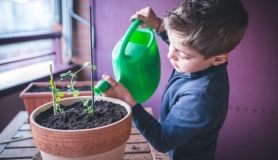‘A child needs love and attention, a hug is the nicest thing for a scared and lonely child.’ Clare Marshall, care leaver
Most parents know that the most important job in the world is not being a neuro-physicist, a brain surgeon or the president: the most important job in the world is raising children. This isn’t just a full-time job, it’s a 24/7 job full of highs and lows. Forget pay-rises and perks; raising children offers a lifetime of self-expansion, learning, challenges, love and extraordinary blessings. And the greatest reward is seeing our children grow and flourish in an environment of love and security.
OFFERING LOVE AND SECURITY
Imagine offering that gift of love and security to children who, for whatever reason, cannot live with their birth families. Becoming a foster carer for vulnerable children literally changes lives. A woman who works in my husband’s office, Diane, has fostered over 20 ‘troubled’ teenage boys alongside raising her own family. There have been times of despair and times of pure joy, but she says she has never looked back with regret. She recently told me about one of the boys she fostered who had been excluded from all local schools. Determined to help him, she took the day off work and sat in an office for over three hours, refusing to leave until she had secured him an apprenticeship. Where everyone else had given up on him, Diane sent the message loud and clear: I believe in you, and I will make sure others do too. She recently bumped into him in town; now an adult with a partner and child, he’d just finished an MA in Music. Not all of the boys she fostered went on to get university educations but they all went forward in life knowing that someone, somewhere believed in them and loved them: the greatest gift we can give another human being. She still has contact with every one of them, and seeing them grow into loving, mature adults, she says, has been a humbling experience. Beneath those ‘troubled young men’ were kids who just needed to feel loved, secure and appreciated.
FOSTER CARE FORTNIGHT
Foster Care Fortnight is The Fostering Network’s annual recruitment campaign. Its aim is to get as many people thinking and talking about fostering as possible, and break down some of the myths around becoming a foster carer. This year, they are putting the stars of fostering – including celebrities, politicians and foster carers – in their online ‘picture frame’, to highlight the need for around 9,000 new carers across the UK to provide loving and supportive homes for some of our most vulnerable children. Supported by celebrities such as children’s writer Jacqueline Wilson, and celebrity baker Lorraine Pascale who was herself fostered, Foster Care Fortnight is a celebration of the difference fostering can make to a child’s life.
WHAT IS FOSTERING?
Fostering involves caring for a child in your own home when they are unable to live with their birth family. There are many different types of foster care: some children need a foster home for just a few days, until they return to their birth family or move on elsewhere, while others will need a family to care for them for many years. Helping children keep contact with their birth families is often an important part of a foster carer’s role. All foster carers receive a fostering allowance which covers the cost of caring for a fostered child. If you are approved to become a foster carer there are a various sources of on-going support available to you. The most important will be your supervising social worker, a member of the team allocated to support you from your fostering service, who should meet regularly with you to discuss any concerns you have, offer you supervision, and arrange any training you feel you need.
REAL LIFE STORIES
Elaine has been fostering with her husband Keith for 16 years, most recently looking after unaccompanied asylum seekers and teenagers:
“We find that when children come to us they have lost their confidence – their self-esteem, their identity. By the time they’ve been here for a while, and we’ve gone through a lot of listening and talking they move on to become more accepting of everything. They gain a role in life. They might pass exams and be absolutely thrilled. It’s fantastically satisfying for us to see that. When children move on it can be painful, but we have to deal with it by thinking it’s a job really well done.”
To find out more about fostering, including what foster carers do and the kinds of children who need fostering, visit the Fostering Network’s website. There are many inspiring stories, videos and blogs from foster carers and those who have been fostered – here are just a few:
Care leaver Yaacov Goldin writes about how his foster carers helped him achieve his dreams – you can also link to other short blogs about fostering from here
Foster carer Patricia shares what happened when she told her foster son ‘you can do anything’
Foster carer Jean talks about offering unconditional love to her foster child
Care leaver Kay Jay speaks about the importance of encouragement and respect in foster care
Single foster carer Jim Bond, who has fostered for 18 years, shares the privileges of fostering
Pearl, a foster carer whose mother also fostered, talks about the difference believing in a child makes to their life when they’re ready to give up
Celebrity baker and TV personality Lorraine Pascale writes about her own experiences of being fostered







